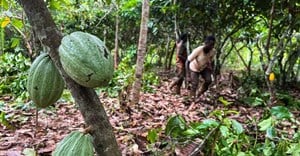Saving the bees: How Nedbank and WWF are working to ensure honeybee survival

The Western Cape is rich in natural landscapes, and Grabouw is no exception, making it the ideal location for the trip. Surrounded by mountain valleys, lush forests, and abundant wildlife, it’s clear how vital it is for us to actively contribute to the preservation and growth of these environments.
A good place to start would be with the honeybee.
Bees and farmers: A mutually beneficial relationship
The trip started at Overberg Honey Co., a family-owned beekeeping business specialising in the pollination of fruit and vegetables and the production of honey and bee products.
There, we spoke to Daniel Vorster, managing director, who discussed the company's efforts to ensure the pollination of crops by renting out hives to local farmers.
“A bigger part of our business is pollination,” said Vorster. “So many crops are reliant on bees. Our income is 60% pollination, 40% honey.”
This mutually beneficial relationship supports the bees, farmers, and conservationists alike. The bees are able to visit the necessary plants needed to produce their honey, the farmer is able to ensure the survival of their crops, and the conservationist is able to ensure a good quality of life for both species.
This programme falls in line with WWF’s efforts to make sure farmers incorporate more sustainable agricultural practices that work, instead of using the harmful methods they are used to.
The Cape Honeybee
We were also able to learn more about these insects, specifically the Cape Honeybee.
For example, unlike other bee species that rely on their queen for hive survival (due to worker bees only being able to lay male eggs), the Cape Honeybee has a unique advantage: It can produce female eggs, enabling the colony to grow without her presence, and, when the time comes, create a new queen by feeding a special cell with royal jelly.
However, the Cape Honeybee is also considered an invasive species, as it has a tendency to invade more productive hives, gradually taking over and eventually eliminating the original colony.
Despite the unique advantages of the Cape Honeybee, the species also presents challenges in the ecosystem. In addition to these complex dynamics, there are various threats facing honeybees.

Why are honeybees important?
“Every third bite of food you put into your mouth, you have to thank a honeybee,” says Crecilda van der Merwe, nature conservationist, beekeeper, and director of Fish Hoek Farms. “There are about 50 types of crops that would not be able to produce and sustain us the way that they do, not just physically, from the fruits and seeds, but also from an economic point of view.”
Van der Merwe highlights several key points in her statement:
Bees are important to agriculture
- Successful pollination plays a role in improving overall crop production by increasing fruit set, weight and quality.
- In South Africa specifically, bees pollinate over 50 types of crops. This ensures that we have a diverse supply of seeds and fruits.
Bees are important to the economy
- Roles such as beekeeping and farming are ways in which bees contribute to job creation.
- This, in turn, supports food security and reduces poverty.
- Similarly, the sale of bee products such as honey, propolis, and beeswax, generates income.
What are the factors threatening honeybee survival?
- Habitat loss
- Pesticides
- Pollution
- Climate change
- Diseases and parasites

What is being done to counter these threats?
- Conservation Champions
In 2004, the WWF Nedbank Green Trust formed this initiative, partnering with farmers who are committed to biodiversity-friendly and regenerative farming practices, conserving their natural fynbos areas and improving their water and energy efficiencies.
Today, over 60 fruit and wine farmers in the greater Cape Winelands Region have earned this title.
With support from Nedbank, these farmers are able to commit a percentage of their earnings to reforestation by planting indigenous trees as forage for the honeybee.
Members of the initiative utilise the distinctive sugarbird and protea logo on their wine bottles, making it easier for consumers to identify and support these producers.
- Creating a corridor of indigenous vegetation
Similarly, efforts are being made to restore indigenous buffer plants.
A key species, palmiet, found in river areas, is an indigenous buffer plant that cleans the water, as well as stabilises and slows down the river flow.
The absence of these plants leads to destruction in the orchards and landscape, which was evident when the Western Cape experienced floods recently.
The team behind the restoration are working with fynbos ecologists and horticulturists to establish the adequate species needed to kick-start the regrowth.
By establishing these indigenous nurseries, they are not only creating jobs but actively providing the honeybee with foraging grounds.
Related
South Africa as G20 leader can take action on Africa’s food supply: 4 ways to make a difference 2 days The future we choose: Why urgent action on sustainability is South Africa’s only option 8 Apr 2025 BBC’s first ever chief brand officer to present in-person keynote at Nedbank IMC 8 Apr 2025 Africa's top climate negotiator says 'no reverse gear' on commitments 4 Apr 2025 From breaking bad to business grad and how to deal with pressure 3 Apr 2025 SA to partake in Petersberg Climate Dialogue 24 Mar 2025

























